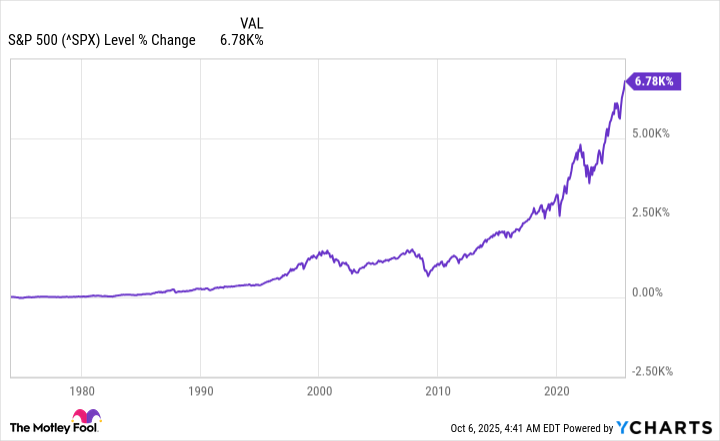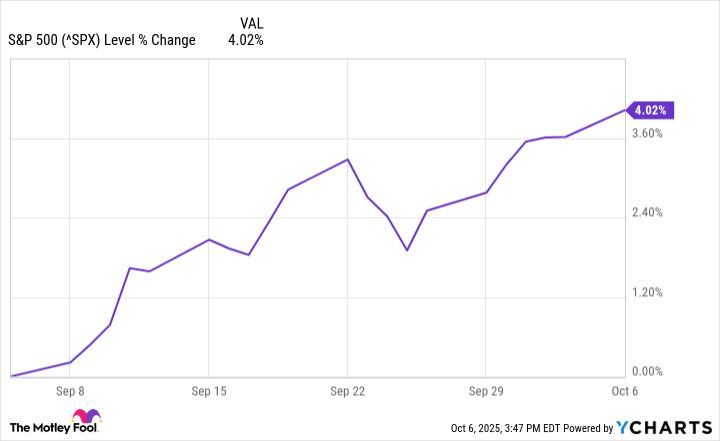There is short-term gridlock in Washington over the budget, but don’t overestimate the long-term impact that it will have on your portfolio.
Headlines are filled with news of the U.S. government shutdown thanks to a budget impasse. There are real-world impacts from this event and it is both serious and worth watching. However, you need to keep what is likely to be a short-term issue in perspective when you consider the long-term investment approach you take. Here’s what you should do instead of panicking.
The media’s job is to grab your attention
Budget battles in Washington are actually a pretty common affair, as each political faction attempts to advance its priorities. On occasion disagreements lead to a failure to find common ground, and the necessary bills needed to fund the government don’t get passed in time to keep the government funded. When that happens the government is “shut down.” Even the U.S. government needs to work within a budget.

Image source: Getty Images.
“Shutdown” is a rather harsh word, since the government isn’t exactly shut down. For example, the Social Security Administration (SSA) provided a contingency plan for a shutdown before it began. According to that plan, the SSA employed 51,825 people before the shutdown and following the shutdown it plans to retain 45,628 of those employees. That’s hardly shutting down, and Social Security recipients are still going to be paid.
Simply put, the government will continue to operate select services that are deemed vital. The big impact is going to be on what some would consider less essential government-run operations, such as national parks and museums. And some essential employees may be asked to work without pay until a budget is passed, and then get paid retroactively. On that note, it is important to keep in mind that the longest shutdown to date lasted roughly a month (35 days).
Even though most media outlets are covering the shutdown intensely, and it could affect parts of the economy directly and indirectly, history suggests that it probably isn’t as big a deal as it may seem for most investors and for the markets. Remember, the media, including financial media, is trying to get your attention so it can generate advertising revenue. Turning news events into something huge and exciting is how it does that.
Step away from your portfolio
There is a problem here that investors should pay attention to. The news frenzy around the budget impasse could lead some people to make short-term investment decisions that end up being bad for their long-term financial health. Letting emotions drive investment choices is usually a bad choice. The chart below offers evidence that government shutdowns have little real effect on markets.
Data by YCharts.
The chart shows the performance of the S&P 500 (^GSPC 0.36%) since 1974, which is when the Congressional Budget Act was passed. It’s a pretty darn good return, right? As the chart highlights, the S&P 500 index has advanced more than 6,700% even though there have been multiple government shutdowns along the way. So far, not a single shutdown has resulted in the permanent destruction of capital.
Data by YCharts.
The shutdown started Oct. 1. As the one-month chart above shows, the market isn’t reacting negatively … so far and is maintaining its current upward trajectory. That said, there could be near-term uncertainty. Emotions can be a powerful force on Wall Street, and the longer the shutdown lasts the more emotional investors are likely to get. Try not to get carried along with the herd. Step back and think about your long-term goals. For example, if you are a buy-and-hold investor, don’t suddenly start selling all of your stocks. If history is any guide, this situation will blow over in a month or so, and maybe much sooner.
Little reaction so far
So far there’s no indication that a precipitous bear market has begun. Wall Street appears to have seen the news and continued along its merry way. That’s exactly what you should do, too. In fact, history suggests you should keep doing that even if Wall Street starts to notice that there is a government shutdown going on.
Sticking to a long-term buy-and-hold investment plan has been the winning play through all of the shutdowns that have taken place to date. In other words, you are better off doing nothing than reacting rashly and making emotionally driven portfolio decisions.


